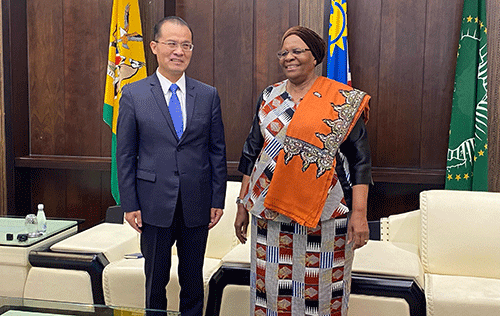Bilateral trade between China and Namibia reached approximately US$1.3 billion in 2024, emphasising a robust and growing partnership between the two countries.
With China’s continued commitment to expanding trade with Africa, officials hinted at even greater economic cooperation soon.
China’s ambassador to Namibia Zhao Weiping made these remarks during a courtesy call on President Netumbo Nandi-Ndaitwah at State House yesterday.
He also provided an update on the Forum for China-Africa Cooperation (FOCAC) attended by former president Nangolo Mbumba last year.
That meeting culminated in the Chinese government giving a grant to foot the bill for the construction of houses for police officers worth N$1 billion.
“China will open our door even wider to the outside world, especially to our friends in the Global South, including African countries,” the diplomat said.
He added. “I think you will hear good news soon again for China to import more Namibian products. I will not announce it now, but you just wait.” Beyond agriculture, the mining sector remains a cornerstone of China-Namibia economic collaboration. Two uranium mines, Husab and Rössing, are the major pillars of this relationship.
“These mines contribute around 7% of Namibia’s national GDP and have created approximately 6 000 jobs for Namibians. In addition to economic output, the mines have made significant contributions to public infrastructure and community development,” he said.
He noted that Rössing Uranium recently funded the construction of a new police station in the Erongo region, a project valued at over N$20 million. Similarly, the Husab mine has been involved in a range of philanthropic efforts benefiting local communities.
On her part, Nandi-Ndaitwah was equally impressed with the partnership.
“On our side, we are ready to strengthen the cooperation, which has always been a mutual benefit between the two countries,” she said.
Nandi-Ndaitwah said Namibia will continue to endeavour to make contributions to the international agenda and see how best the people of Namibia can benefit.



